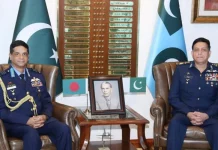DM Monitoring
LONDON: British MPs have hit back after Narendra Modi’s government summoned the British high commissioner to India to warn against the UK parliament staging debates on the mass protests by Indian farmers.
The new UK High Commissioner, Alex Ellis, was summoned on Tuesday by the foreign minister, Harsh Vardhan Shringla, after India concluded that MPs had staged an imbalanced debate that represented a “gross interference” in India’s internal affairs.
In the 90-minute debate, the MPs, mainly from Labour, criticised the reforms and urged Boris Johnson to take up the suppression of the protests when Modi attends the G7 summit in June. The debate was called after more than 100,000 people had petitioned parliament to discuss the protests.
Layla Moran, the Liberal Democrat foreign affairs spokeswoman, criticised the Indian government’s summoning of Ellis and defended the UK parliament’s right to criticise India’s handling of the protests.
She said: “What we saw in parliament was the power of democracy. What started with a petition from a local Lib Dem councillor led to ministers being held to account on their duty to stand up for human rights around the world. The Indian government should have respect for our democratic traditions and our right to scrutinise our own government.
“Media freedoms and the right to protest should be values our two countries share as part of a strong relationship. Many in the UK have family living in India and are rightly concerned by the treatment of peaceful protesters during the recent protests. I hope our UK high commissioner put these concerns across during the meeting and defended the right of our parliament to debate.”
The UK parliament’s petitions committee was required to consider whether to stage a debate after 116,000 people had petitioned it to do so. The petition was created by the Liberal Democrat councillor Gurch Singh, whose family is from a farming background in the Punjab.
Singh said he was prompted to launch the petition after he found his mother in tears watching the Indian news channels’ coverage of the protests. He then spoke with relatives in India and with members of his local community.
During Tuesday’s debate, the former Labour leader Jeremy Corbyn said democracy was in danger in India. He said: “They are protesting because they are predominantly small farmers on less than five acres, many of them very poor. Over 22,000 have committed suicide in the past few years as a result of the stress they are under. It is as if globalisation has been forced upon them, and they do not want it.”
Pat McFadden, a shadow treasury minister, said the peaceful conduct of the protesters was “a rejection of the idea that those engaged in the protests are somehow not loyal to India, or that the response to people fighting for their livelihoods should be to suggest that they are somehow externally controlled, or to place a question mark over their motivations, saying that they are against the state in a broader sense.
John McDonnell, the former shadow chancellor, urged the prime minister when he visited India to meet journalists to discuss the crackdown on their profession. Tahir Ali, the MP for Birmingham Hall Green, said Modi and his party, the BJP, had “responded to the protests with repression”. He said: “Political opponents of Modi in India are at risk of arbitrary arrest, and the civil liberties of all Indians are being eroded by an extremist, rightwing government.”
Ministers have tried to distance themselves from criticisms of the reforms, saying: “We recognise that governments have the power to enforce law and order if a protest crosses the line into illegality.




